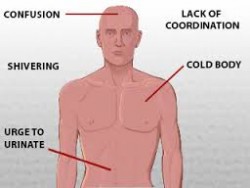
Collectively, amphetamines and amphetamine derivatives such as dextroamphetamine, levoamphetamine, and methamphetamine are stimulant drugs that increase heart rate, blood pressure, respiration, temperature, energy, and stamina, affecting various neurotransmissions within the brain and central nervous system.
Therapeutic doses of amphetamine are helpful in treating ADD/ADHD, narcolepsy, and obesity, but, the trends of abuse continue to grow leading to increased rates of amphetamine overdoses. In the most recent data collected for the years 2011 and 2012, the Center for Behavioral Health Statistics and Quality (CBHSQ) reports that on an average day, an estimated 850 young adults aged 18 to 25 used “licit or illicit stimulants non-medically” for the first time.
An amphetamine overdose does not necessarily have to involve taking too much of the drug, these types of overdoses can occur in a variety of scenarios and for a number of reasons.
The following, are 10 amphetamine overdose symptoms you should be aware of:
1. Hypothermia

Amphetamine overdose can cause hypothermia.
Amphetamines raise temperature levels to dangerous degrees and can lead to hyperthermia or unusually high body temperatures. Even the smallest amount of amphetamine can cause hyperthermia to the extent that the person becomes severely dehydrated or vital systems and organs begin to malfunction.
2. Seizures
Seizures are severe neurological problems and can result in rapid fatality or life-long disabilities including brain damage.
3. Rapid Pulse
A rapid pulse can lead to damages in the blood vessels or heart valves and increase the risk of severe cardiovascular problems, stroke, or bleeding in the brain.
4. Rapid Heart Rate
Increasing heart rate to dangerous levels can cause arrhythmias, cardiac failures, or heart attacks. Sudden cardiac death is often related to amphetamine overdose because the drugs are commonly used to increase physical performance and stamina in activities involving high exertion levels.
5. Irregular or Difficulty Breathing
Irregular or difficulty breathing can lead to decreased oxygen levels in the blood and preclude seizures, stroke, respiratory or cardiac failure. Bluish-colored lips or fingernails indicate amphetamine overdose symptoms resulting from low oxygen levels in the blood.
6. Tremors or Excessive Shakiness
Tremors and excessive shakiness are forewarning amphetamine overdose symptoms you should be aware of as signs of over-stimulation in the central nervous system which can lead to any number of bodily system or organ failures.
7. Cognitive Difficulties
Confusion, poor judgment, fainting, and loss of consciousness are amphetamine overdose symptoms you should be aware. They often preclude or coincide with more imminent dangers.
8. Uncontrollable Anxiety
Uncontrollable anxiety is a common amphetamine overdose symptom that can be a precursor to more dangerous psychological disorders and adverse behaviors.
9. Loss of Coordination
Loss of coordination, clumsiness, and muscle weakness, slurred or difficult speech can be serious symptoms resulting from neurological and other bodily system malfunctions during amphetamine overdose.
10. Amphetamine Psychosis
Amphetamine psychosis can present itself through extreme panic, mania, paranoia, hallucinations, delirium, and schizophrenic-like behaviors. These amphetamine overdose symptoms are not only dangerous to the user, but, to others as well.


